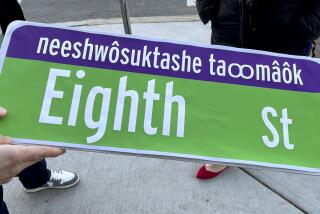Choctaws Publish Books to Preserve Their Culture
- Share via
PHILADELPHIA, Miss. — Mississippi’s Choctaws have turned from oral history to the printing press in an effort to preserve and spread their language, values and dreams.
“Our primary goal has been to develop information for the kids in our own school, but we are now getting the word out to other schools,” said Bill Brescia, who heads Choctaw Heritage Press. “We thought it would be more efficient to reach the children first and, through them, the entire population.”
The publishing operation was established by the Mississippi Band of Choctaw Indians five years ago to develop print and video materials geared primarily to the tribe of about 5,000, many of whom live on a reservation near Philadelphia in east-central Mississippi.
The publications are printed in Choctaw or English and sometimes in both languages.
“Roughly 95% of the kids who come to kindergarten (on the reservation) speak Choctaw as their main language, and Choctaw is the language everyone uses at home,” Brescia said. “Probably, with the exception of the Hopi and Navajo, I don’t believe any other group has held onto its language as we have.”
Books for children include ancient Indian words describing modern things, such as the hjolbattoba apisa (television) or natokosili ayipa (ice cream parlor).
Brescia said that the tribe-produced books cover a wide range of topics, from “How the Flowers Came to Be,” a Choctaw story designed to reinforce traditional values, to “Chahta Hapia Hoke: We Are Choctaw,” a book he describes as “everything you ever wanted to know about the Mississippi Band of Choctaw Indians but were afraid to ask.”
The tribe’s experience with the white man was turbulent, from the Spanish in the 1500s through the early days of the United States. Mississippi’s band of Choctaws withstood pressures for more than 80 years to join other Southern tribes in moving from their homeland to Oklahoma. More than 8,000 Choctaws were still in Mississippi in 1918, when the federal government finally acknowledged that the tribe was not going to migrate.
Brescia, a Chicago native whose mother was part Indian, said that the publishing organization has made a serious attempt to reach people outside the reservation.
“It’s hard to believe, but there are people who live in the next county who do not know we exist,” he said.
Teachers across the state are being made aware of the Choctaw publications, he said, and “people are beginning to know who we are. But we’ve got a long way to go--no one is calling up and wanting to make a movie about us.”
More to Read
Sign up for Essential California
The most important California stories and recommendations in your inbox every morning.
You may occasionally receive promotional content from the Los Angeles Times.













